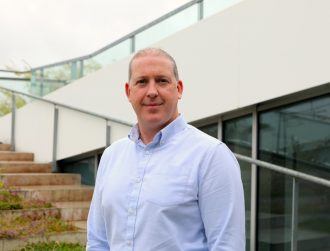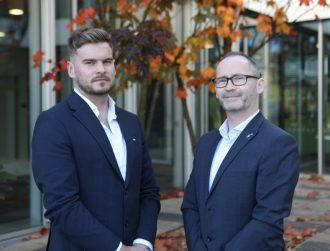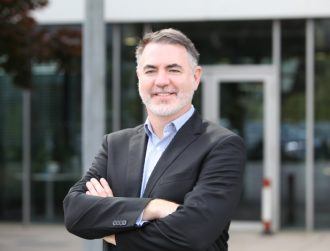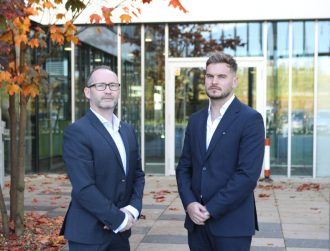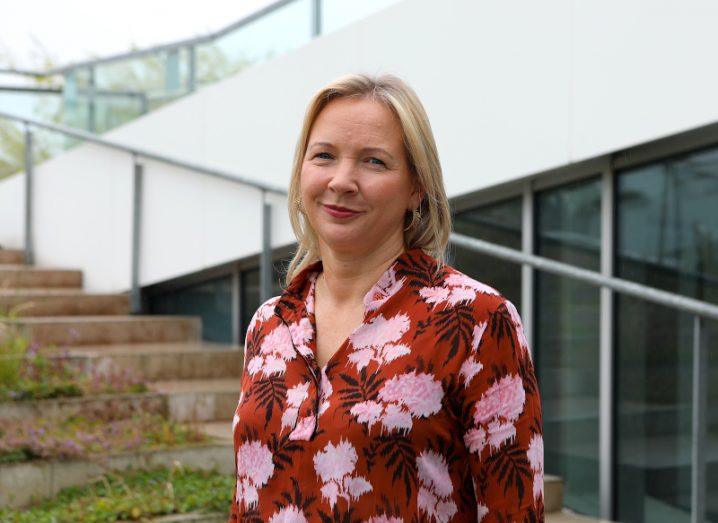
Eimear Hickey, Aurora Telecom. Image: © Connor McKenna/SiliconRepublic.com
Aurora Telecom’s Eimear Hickey explains the sustainability challenges the telecoms industry faces and how they can be addressed.
Everything in technology creates some form of waste or consumes vast amounts of energy – often both – which create problems for our planet.
Whether it’s the ongoing concerns around power-hungry data centres or the growing piles of physical electronic waste, every section of the tech industry has a lot of work to do to offset its own footprint and the telecoms industry is no different.
Eimear Hickey, the commercial contracts manager for Aurora Telecom, told SiliconRepublic.com that the traditional model for telecommunications carriers to develop networks means that each one constructs its own network without allowing others to use it.
“This would result in multiple carriers constructing networks on the same roads over the course of several years. This entails a large amount of spoil having to be removed and backfilled with new virgin material, which is less sustainable, quarried material (sand, gravel etc) and then having to reinstate the road (tarmac/concrete),” she said.
“Fibre networks can require a large number of resources to build and maintain, including raw materials like glass and plastic for the fibre optic cables, as well as energy and water for manufacturing processes. These resources are limited and it is important to consider ways to conserve them and minimise waste.”
In addition to the waste that can be produced from this process, fibre networks also produce electronic waste through manufacturing processes or end-of-life waste from components that are no longer useable. These must be properly disposed of as e-waste can be extremely harmful to the environment.
“Overall, delivering a fibre network involves a number of sustainability challenges that must be carefully considered and addressed to ensure that the network is built and operated in a responsible and sustainable manner,” said Hickey.
“This can involve a range of strategies, such as implementing energy-efficient technologies and processes, conserving resources, managing e-waste properly and engaging with local communities to minimise social impacts.”
Addressing the challenges
Hickey said Aurora Telecom works closely with its own sustainability team to implement processes that ensure it manages its operations in an environmentally responsible manner.
“Our service model is a carrier’s carrier. As such, our network is designed with an ultra-high fibre count which can be leased to both corporate organisations and telecommunications carriers,” she said.
“By utilising our network, all this activity, materials and environmental cost is avoided. On an ongoing basis, only our maintenance and service level agreements are required to cover the same network and encompass a large number of carriers, thereby reducing further the activities on these routes.”
The company also has three long-term period contracts for civils and fibre works and co-location. Under the process, Hickey said the successful suppliers and contractors were obligated to meet high criteria for environmental and sustainable requirements.
“We also benefit from a multi-utility model whereby when large gas projects are being constructed by our parent company, Gas Networks Ireland, we liaise with them to insert both telco and gas infrastructure, thereby further saving valuable materials and associated civil works,” she added.
“We utilised mole ploughing and directional drilling techniques in the construction of our network. These work practices are recognised as efficient, effective and having an overall reduced impact to the environment.”
Other efforts include using free-air cooling systems at its co-location sites to reduce emissions and minimise environmental impact. “We are installing 12 new generators on our sites. They are HVO-enabled so will have the ability to use hydrogenated vegetable oil in the future.”
Another issue that can come with expansion and development in industry, is its effect on the land upon which it is building. Natural habitats can be disrupted, effecting the biodiversity in the area.
Hickey said to address this, Aurora Telecom works with an ecologist at two of its co-location sites where it is extending its footprint to determine if nests are present before removing any trees.
“In line with our no net loss, biodiversity net gain, these two projects will see a number of non-native trees replaced with native Irish trees in line with our landscaping for biodiversity guidelines.”
Preparing for the future
The need to remain sustainable will become more important as the need for data and connectivity continues to grow.
To demonstrate exactly what that growth looks like, one study from Huawei estimates that global data will be growing by one yottabyte per year by 2030, which would be a 23-fold increase compared to 2020. One yottabyte equates to approximately a million trillion megabytes (MB).
As a result, telecom companies have had to invest in upgrading their networks to support higher levels of data traffic and provide faster speeds and better coverage.
Additionally, Ireland’s new digital connectivity strategy includes a target of having all business and homes connected to a gigabit network by 2028.
With all this in mind, Hickey said that when considering deployment and management of networks, companies should engage and manage their contractors to ensure that they follow their company’s guidelines and policies to mitigate the risk of any negative impact on the environment and communities.
“Finally, I believe it is important for all sectors, not just telecom companies, to continue to invest in employee training and development to ensure that their workforce has the skills and knowledge needed to support the company’s future growth,” she said.
“This type of investment will benefit every aspect of your business including agility in developing new products or services or improving the customer experience.”
10 things you need to know direct to your inbox every weekday. Sign up for the Daily Brief, Silicon Republic’s digest of essential sci-tech news.

